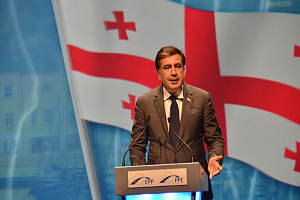Georgia’s Main Opposition Party Splits
By Natalia Konarzewska
March 16, 2017, the CACI Analyst
The crushing defeat in Georgia's October parliamentary elections will have far-reaching consequences for the former ruling party, the United National Movement (UNM). The election results sparked a heated conflict in the UNM leadership and prompted a group of senior party members to challenge former President Mikheil Saakashvili's leadership in absentia of the party. In mid-January a group of party members opposing Saakashvili, including prominent figures, left the party. On January 20, UNM's party congress decided to leave the chairman position vacant until the former president is able to return to Georgia. Saakashvili currently resides in Ukraine, where in late 2016 he launched a new oppositional political initiative after resigning from the post of Odessa governor.

Ruling party claims victory in Georgia’s parliamentary ballot
By Natalia Konarzewska
November 25th, 2016, The CACI Analyst
Georgia held parliamentary elections on October 8 and 30. Georgia’s ruling party, Georgian Dream-Democratic Georgia (GDDG) emerged decisively victorious and was able to secure a constitutional majority after a run-off election in the end of October. Although GDDG was able to gain widespread support, the low turnout suggests disappointment among voters, caused especially by the failure of Georgian authorities to counter the country’s economic downturn and worsening socio-economic conditions. International observers described the elections as well-administered and competitive, but the turbulent campaign sparked fears of violence in the aftermath of the elections.
Despite Georgia-Azerbaijan gas deal, distrust is sown
By Boris Ajeganov
March 7th, 2016, The CACI Analyst
Uncertainty on the future of Georgia’s energy security has been growing since late 2015, when Georgia’s minister of energy and deputy PM Kakha Kaladze met with Alexey Miller, CEO of Russia’s Gazprom twice in the span of a month. Discussions on Gazprom’s potential return to the Georgian market quickly raised eyebrows in Baku and caused popular protests in Tbilisi. In a March 4 turnaround, Kaladze announced a deal to receive additional gas from Azerbaijan, thus removing the need to import Russian gas. Party politics aside, Tbilisi appears to have skillfully used its strategic position in the South Caucasus to secure a favorable energy deal without sacrificing its sovereignty.
Russia's Gazprom to deepen its presence in the Georgian market?
By Natalia Konarzewska
December 7th, 2015, The CACI Analyst
After meeting with Gazprom’s CEO Alexei Miller in Milan on September 25, Georgia’s Energy Minister Kakha Kaladze announced that the parties discussed increasing Russia’s transit of gas to Armenia and opened a possibility for Georgian commercial entities to buy additional volumes of Russian gas. In October, Kaladze reiterated that Tbilisi wants to diversify its natural gas routes and suppliers through imports from Russia and possibly Iran. No details about the eventual increase of gas shipments from Russia have so far been revealed. Yet the prospective agreement has already caused controversy among Georgian political opposition, which questions Gazprom’s reliability as a gas supplier, and raised concerns in Azerbaijan, which is Georgia’s largest gas provider.
ICC prosecutor to investigate August 2008 war crimes
By Eka Janashia
November 19th, the CACI Analyst
In mid-October, the prosecutor of the Hague-based International Criminal Court (ICC), Fatou Bensouda visited Georgia in an effort to open a probe into war crimes committed during the Russia-Georgia war in August 2008. “There are no substantial reasons to believe that the opening of an investigation would not serve the interests of justice,” she said.
On October 13, the prosecutor filed a 160-page “request,” involving the details of suspected crimes attributed to the Georgian, Russian and South Ossetian sides, before the ICC three-judge panel. The panel will make a decision on whether to launch an investigation in Georgia covering the period from July 1, 2008 to October 10 of the same year.







